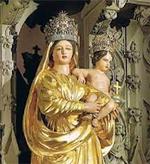Catholic World News News Feature
Why was a Canadian bishop a target for airport security? October 02, 2009
When Bishop Raymond Lahey of Antigonish was caught carrying child pornography on his laptop computer, journalist Terry Mattingly of the GetReligion blog asked a simple question: Why?
Not just why did Bishop Lahey have child pornography. That's the question that everyone is asking. Mattingly had another: Why did the police search the bishop's laptop?
Tens of thousands of people pass through airport security systems every day, carrying laptop computers. The computers are routinely scanned, but the files on the hard drives are not. Why did security officials "just happen" to search this one computer, belonging to this one bishop?
Mattingly cites a report in the Montreal Gazette , which raises more questions than it answers:
Det. Dan Melchiorre, the lead investigator on the case and a member of the Ottawa Police High Tech Crimes Unit, says Lahey was not known to the Ottawa Police, or a target of its ongoing, anti-child porn program, before his arrival at the airport. Rather, he says Lahey “triggered” the interest of airport security agents who then conducted a secondary search of his computer.
What sort of behavior would trigger the interest of security personnel, and prompt them to search a passenger's computer? It seems highly unlikely that the airport guards suspected Bishop Lahey was a member of Al Qaida, carrying terrorist plans on his laptop. No; they were looking for porn.
The story takes a surprising new turn with this report from the Canadian Broadcasting Centre, in which a man who was a victim of sexual abuse years ago reports that he warned police in the 1980s about a Father Lahey who was using child pornography.
"I think the [Royal Newfoundland Constabulary] dropped the ball on it big time," Billy Earle, of St. John's, told CBC News Thursday. "Senior officers on the job right now dropped the ball on this big time."
Yes indeed, the police dropped the ball when they failed to follow up on that report in 1989-- although to be fair, as the CBC points out, "Possession of child pornography only became a crime in the 1990s."
But if the police were informed in 1989, is it unreasonable to suspect that Billy Earle might have brought his complaint to the attention of Church officials as well? Or that police, having heard a rumor that they could not pursue (since no crime had been committed), might have passed along the rumor to their friends in the Church?
How many clues were ignored, how much evidence was swept aside, as Father Lahey became Bishop Lahey, and assumed pastoral leadership of the Antigonish diocese? As that diocese moved toward a crippling $15-million settlement to compensate the victims of clerical abuse, were there any officials in the Canadian hierarchy aware that the bishop at the helm of the embattled diocese was himself accused of sexual misconduct involving the exploitation of children?
We don't have the answers to these questions-- or to Terry Mattingly's question. But we do know that somehow, airport security guards knew enough to search Bishop Lahey's laptop. If only Church officials had been equally diligent in checking the bishop's baggage!
And when I say "equally diligent," keep in mind that in this case, as one expert witness has testified, the police "dropped the ball on it big time."
The arrest of Bishop Lahey is one more devastating blow to the credibility of the Catholic hierarchy. As the prosecution of his case moves forward, we can expect more dramatic evidence that the sex-abuse scandal in the Catholic Church-- and the far more grievous scandal of dereliction of episcopal duty-- is not yet behind us.






